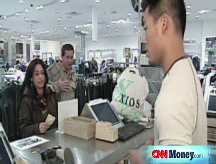Consumers: The 21st Century Weeble
Despite tough times, the consumer has wobbled but kept spending. But will Americans pull back now that cash from the stimulus checks are mostly gone?

NEW YORK (CNNMoney.com) -- Surprise! It appears that the death of the American consumer, just like Steve Jobs, has been greatly exaggerated.
Although the Commerce Department reported Friday that personal income in July fell a greater than expected 0.7% as the effect of the tax rebate checks began to fade, consumer spending was still up a slight 0.2% during the month, in line with economists' forecasts.
The U.S. consumer has had to endure a ton of economic headwinds so far this year: declines in housing prices, tightened credit standards, rising energy and food costs, and finally a net loss of 463,000 jobs and a rising unemployment rate.
Nonetheless, consumer spending, which remains the biggest engine of growth in the economy, has yet to dip in the past few months. The consumer reminds me of those old Weeble toys from the 1970s: they wobble but they don't fall down.
Some retailers have had more upbeat guidance than expected in the past few days. Shares of luxury retailer Tiffany & Co. (TIF) and the lower-end jewelry chain store company Zale (ZLC) both surged yesterday after the companies boosted their profit forecasts for the coming quarters.
Womens' clothing company Talbots (TLB) and athletic equipment and apparel chain Dick's Sporting Goods (DKS) also have upped their earnings targets for this fiscal year in the past week. So clearly, some retailers are holding up in these uncertain times.
Still, it's hard to deny that the consumer is finally starting to show some signs of strain. And there were some troubling details in the July personal income and spending report as well.
For one, spending in July was down from the stimulus check-fueled 0.6% increase in June. And with the rebates now mostly spent, it may be tough for consumers to keep spending as much as they did earlier this summer.
Even more worrisome is that it appears inflation is a big reason behind the increased expenditures in the first place - real spending, when chained to 2000 dollars, fell 0.4% in the month. That follows a 0.1% decline in real spending in June.
And despite all the concerns about inflation, some consumer companies are being forced to cut prices in order to entice people to spend.
Personal computer maker Dell (DELL, Fortune 500), for example, reported better-than-expected quarterly sales on Thursday. But its profits surprisingly slipped as the company offered discounts to try and stimulate demand...not to mention fend off tough competition from top rival Hewlett-Packard (HPQ, Fortune 500).
Finally, one of the biggest problems buried in the personal income and spending report was this little nugget: Personal savings, as a percentage of disposable personal income, was just 1.2% in July, down from 2.5% in June.
In times like this, it's certainly a concern that consumers are unable, or unwilling, to put more money aside for the proverbial rainy day, retirement and what have you.
So even though the consumer has been - say it with me again - resilient, we could be facing a dip in spending down the road if pricing pressures don't continue to recede and the economy doesn't sputter back to life.
Anyway, I hope all my readers enjoy the Labor Day weekend! The Buzz is taking a slightly longer one and will be back on September 3. ![]()



